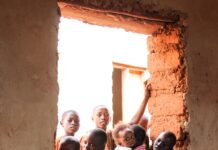The saying goes, if you are not at the table, you are on the menu!
This statement suggests that advocacy by supporters is essential but that lived experiences also matter. If people with firsthand experiences of a particular phenomenon are not part of decision making processes, then they will likely get left out. For many underrepresented and under-served populations, including refugees and immigrants in the San Diego region, this is a reality that they must confront. While some residents actively participate in civic discourse at the community level, that is the extent of their contributions. This is in part because they have little or no opportunities to affect policies at the City level and beyond, due to a lack of inclusion.
For years, public officials have grappled with the question “how do we actively engage under-served and minority communities in government affairs?” As a former refugee raised in City Heights, I believe that the answer to this question necessitates several answers from diverse communities in our region—it requires that our government innovate and include different perspectives in decision making processes. This can be achieved with the formation of a Citizen Commission on Refugee and Immigrant Affairs.
I recall my adolescent years in City Heights vividly. In different settings, you could identify one flier in English with excerpts in diverse languages including Somali, Spanish and Khmer, among others. This innovative approach resulted because City Heights is a neighborhood where 44% residents are foreign-born welcomed refugees and immigrants from different parts of the world. To accommodate their needs, local community health centers and nonprofit organizations revolutionized their interactions with these populations, a concept known as cultural proficiency. Cultural proficiency suggests that an entity is inclusive of its constituency rather than ostracizing them.
As the nonprofit and business sectors innovate and validate the voices of other residents, local governments have yet to take to take the same approach. Limited interactions between residents and government bodies, including law enforcement agencies, have mandated that community and faith-based initiatives become cultural brokers between the different stakeholders. Last year, our country found itself at a crossroads when the refugee dialogue reached a fever pitch nationwide. Despite its long running history as a welcoming city and home to refugees and other foreign-born residents, the leadership of the City of San Diego did not offer an official response to combat the negative refugee rhetoric. Instead, activists’ call for condemning of fear mongering was met with deafening silence on the part of many public officials.
The San Diego region has a sizeable refugee population. In fact, the County of San Diego is referred to as a refugee-impacted expanse given the number of refugees it welcomes annually. To date, the California Department of Social Services-Refugee Programs Bureau reports that San Diego County has accepted 179 refugees in Federal Fiscal Year 2016, which exceeds both Los Angeles and Sacramento counties. With the events unfolding in the world, it is safe to predict that political refugees and displaced environmental migrants will continue to seek refuge in different parts of the world.
Despite the perils that many refugees and immigrants face, they are eager to positively contribute to our country. Within the San Diego region, we rely on them for transportation purposes. You hail a cab without giving it much thought, but chances are, your driver is a pleasant and welcoming stranger from Ethiopia who is working hard for his American Dream. Or perhaps you patronize local farmers’ markets and support an entrepreneur from Somalia who sells delicious sambusas or a Vietnamese man who sells locally grown vegetables. Many residents have become accustomed to La Tiendas (convenience stores) in their neighborhoods, which attempt to address the concern of food insecurity in under-served communities. People who emigrate from countries with excessive barriers to entry often find ways to help themselves that contribute to San Diego’s diverse vibrant economy. They pursue higher education or attend trade schools that offer career pathways so they can participate in priority sectors including Health Care.
Addressing inclusiveness is not a project but rather a process; one that increases the effectiveness of our democracy. Local governments need to promote an inclusive ethos by making room for these hard working Americans and including their voices in decision making processes. As these communities continue to prosper, it is imperative for our government to engage and be receptive to their needs. In the past, The City of San Diego established different commissions to address the needs of youth (Youth Commission) and women (Commission on the Status of Women). If other sectors can innovate and become inclusive of New Americans, our government can and should do the same. With the creation of a Citizen Commission on Refugee and Immigrant Affairs, the City of San Diego can proactively participate in issues relating to these hard-to-reach populations.




